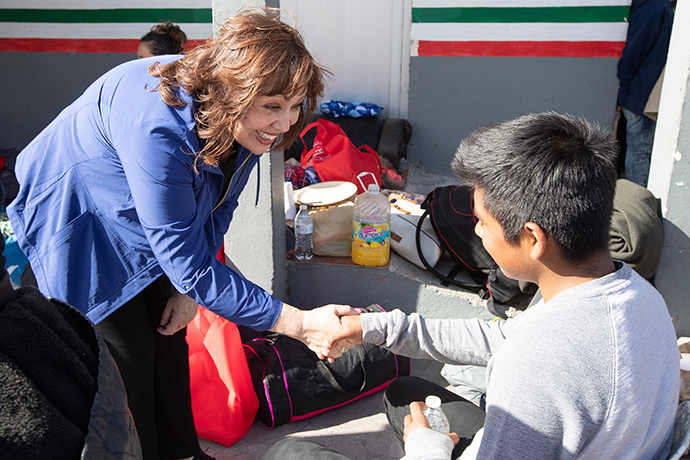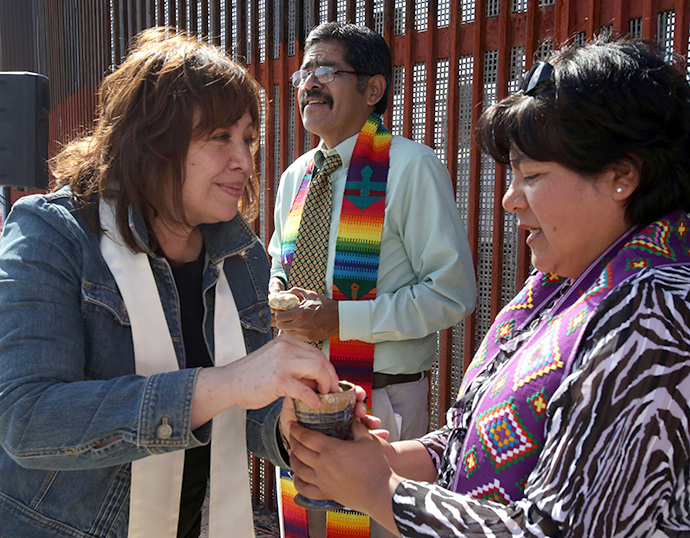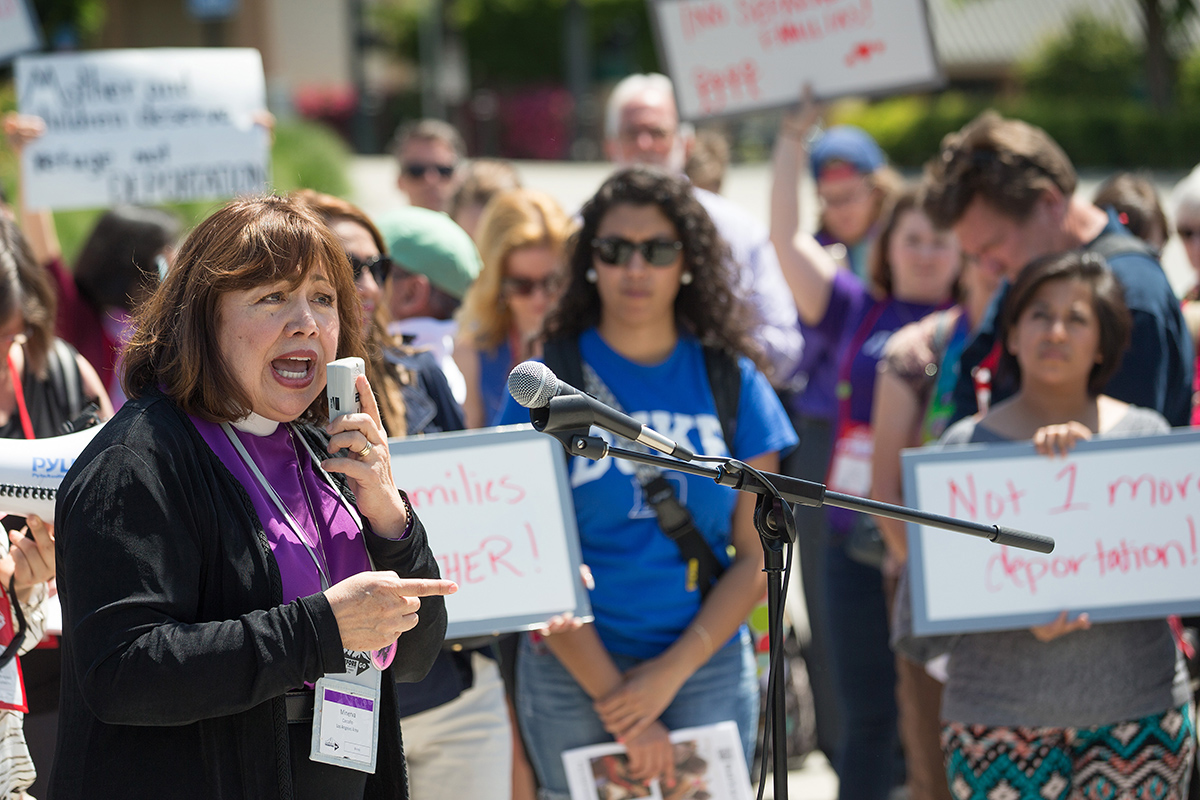Key points:
- The Western Jurisdiction has announced dates for a church trial of Bishop Minerva G. Carcaño, suspended with pay since last year.
- After long maintaining her silence during the judicial process, the bishop spoke to United Methodist News about her decades of ministry.
- She also discussed her experience of suspension from United Methodist ministry while also serving as a leader of two prominent boards outside the denomination.
Longtime United Methodist Bishop Minerva G. Carcaño, suspended from her church duties for more than a year, is now facing a church trial this summer.
The Western Jurisdiction’s website announced that the church trial to adjudicate complaints against the bishop is scheduled Aug. 21-25 at First United Methodist Church of Pasadena, California. Bishop Alfred W. Gwinn, a retired bishop from the Southeastern Jurisdiction, will preside over the trial. Carcaño is facing five charges under the Book of Discipline’s Paragraph 2702.1, which lists the denomination’s chargeable offenses.
However, both Carcaño and the jurisdiction’s leaders have declined to publicly disclose the nature of the accusations against the bishop in the interest of confidentiality for all involved. As in the U.S. court system, the United Methodist judicial process operates under the principle that people are innocent until proven guilty. The United Methodist process also requires the protection of people’s rights to fair process.
Meanwhile, a number of United Methodists have raised repeated concerns that the bishop is not receiving fair process and have called for her reinstatement. Other church members have called for patience as the denomination’s judicial process moves forward.
For her part, the bishop said she wants to be known for more than her current circumstances.
After long maintaining her silence as the denomination’s judicial process progressed, Carcaño spoke to United Methodist News in May about her 47 years of ordained ministry and the church’s impact on her and her family.
“I would like people to know that God used the Methodist Church to save my family from poverty, from the impact of racism and its inequity and as a way forward for so many of us to have a better life,” she said, choking up. “The church opened so many doors for me that I will be forever grateful for. It gave me a different life.”
While much remains in dispute in Carcaño’s case, no one disagrees that the bishop has made as significant an impact on The United Methodist Church as it has on her.
Carcaño, elected bishop by the Western Jurisdiction in 2004, is the denomination’s first Latina bishop and has gained recognition as an advocate for vulnerable communities and a passionate follower of Jesus.
She has championed the human rights of immigrants both within the denomination and on the national stage, including testifying before the U.S. Congress. She has called for the full inclusion of LGBTQ people in the life of the church. She also has served on the boards of various United Methodist agencies and ministries, including Africa University, the pan-African United Methodist institution in Zimbabwe.

As bishop, she has led three of the denomination’s regional conferences in succession — Desert Southwest, California-Pacific and, since 2016, California-Nevada.
“She has been a key voice in a critical time in the life of The United Methodist Church,” said the Rev. Lyssette N. Perez, a United Methodist pastor in New Jersey and president of MARCHA (Methodists Associated Representing the Cause of Hispanic/Latino Americans). The denomination’s Hispanic and Latino caucus has repeatedly urged Carcaño’s reinstatement.
“Bishop Carcaño understands the struggle of marginalized communities, and this is why she has been an advocate for full inclusion in the church and a prophetic voice in claiming the rights for immigrants and refugees.”
Carcaño, 69, grew up the child of migrants and farmworkers, in Edinburg, Texas, in the fertile but poverty-stricken Lower Rio Grande Valley along the U.S.-Mexico border.
Her father had emigrated from Mexico as part of the U.S. Bracero Program, which brought millions of Mexican men into the U.S. to relieve farm labor shortages during World War II and through the 1950s. Among Carcaño’s proudest memories was helping her father study for his U.S. citizenship exam. He became an American citizen when she was in third grade.
Church trial not sure thing
Multiple United Methodist bishops have faced complaints before under church law. The suspension of a bishop under complaint also is not unprecedented.
However, Bishop Minerva G. Carcaño may be the first bishop to undergo a church trial in The United Methodist Church and its predecessor bodies. The United Methodist Commission on Archives and History has found no record of a bishop brought to trial.
Prior cases involving bishops have been resolved one way or another before reaching that point.
The denomination’s Book of Discipline calls a church trial “an expedient of last resort” and urges a just resolution of complaints before it ever gets that far.
The Discipline defines a just resolution as an agreement “that focuses on repairing any harm to people and communities, achieving real accountability by making things right in so far as possible.”
In short, a just resolution remains a possibility. However, Carcaño is dealing with a different situation than previous bishops under complaint. The 2019 special General Conference added the requirement that anyone who filed the complaint be involved in any agreement to resolve the case without a church trial. The parties must also agree on what is disclosed about the case.
Both the length of Carcaño’s suspension and the lack of public details about the complaints have led to worries about the denomination’s commitment to fair process.
Both MARCHA (Methodists Associated Representing the Cause of Hispanic/Latino Americans), the denomination’s Hispanic/Latino caucus, and ethnic leaders in the California-Nevada Conference have called for Carcaño’s immediate reinstatement.
Meanwhile, a group of California-Nevada Conference clergy said that returning Carcaño to active service without a just resolution or the findings of a church trial “would create a depth of conflict and division that could undermine the mission and ministry” of the conference.
The United Methodist Commission on the Status and Role of Women — which advocates for the full inclusion of women in church life — has requested to serve as a monitor as the bishop’s case is being adjudicated.
The board of the United Methodist Commission on Religion and Race — the agency that advocates for racial equity in church life — also has urged the Western Jurisdiction to lift the suspension and make public the general nature of the charges.
“We seek a process with full transparency that does not utilize confidentiality to maintain the church or Bishop Carcaño in a cloud of suspicion,” the Rev. Giovanni Arroyo, the agency’s top executive, told UM News. “We will monitor the continuing process and the trial to ensure that it is just and fair to all.”
But to do so, he added, the agency will need the cooperation of the Western Jurisdiction.
The Rev. Thomas Frank, author of a textbook on United Methodist polity and son of the late Bishop Eugene Frank, said he has mixed feelings about calls to make charges public.
“Transparency seems like a good thing,” he told UM News. “But within a connectional community like the UMC where a lot of people know each other and have worked together sometimes for years, making charges public could be tantamount to ending a career regardless of the outcome.”
Her mother was born in the U.S. to parents who also grew up in the border region.
Through her mother’s side of the family, Carcaño is a third-generation Methodist.
Together with three generations of her family, she attended what is now El Buen Pastor (The Good Shepherd) United Methodist Church, a large Hispanic congregation in Edinburg.
Her earliest memory was of joining with her father and younger sister in decorating the church’s Christmas tree. As her father erected the tree, she said, he told his daughters about how God sent baby Jesus because God loved humanity so much.
“We were both kind of upset that baby Jesus had been born in this stable because we were farm girls and knew what that meant,” Carcaño recalled. “We knew how that smelled.”
But then her father turned on the lights of the Christmas tree in the darkened sanctuary, and she said it was the most beautiful sight she had ever seen.
“I remember thinking as a little girl, ‘God does love us,’” she said.
She also remembers wanting to go to church every chance she got, even if it was just to sit quietly while the adults attended church meetings or her dad helped with building maintenance. During one such visit, she remembers sensing God’s presence embracing her. “At that moment, I committed to finding a way to always live in God’s house,” she said.
The El Buen Pastor congregation helped to fulfill that calling. The church also made it possible for her to serve at the denomination-wide level.
When she was 16, what was then the Board of Education (now the United Methodist Board of Higher Education and Ministry) in Nashville, Tennessee, invited her to serve as a board member. Her financially strapped family had no bank account nor credit card, so the church stepped up to pay for her travel to board meetings, with the board then reimbursing the church.
She continued to serve on the Education Board until she graduated from high school. She served on the Board of Missions (now Global Ministries) while completing her undergraduate studies at what is today the University of Texas-Rio Grande Valley in Edinburg and pursuing her Master of Theology at Southern Methodist University’s Perkins School of Theology in Dallas.
While serving as a pastor and in other church appointments, she continued to serve on various agency boards. She also was elected as a delegate to General Conference, the denomination’s top lawmaking assembly.
She eventually would serve on the boards of Church and Society, Religion and Race, the United Methodist Publishing House, the United Methodist ecumenical office, the United Methodist Higher Education Foundation and, most recently, the General Council on Finance and Administration. She also was a member of the United Methodist Connectional Table that coordinates denomination-wide ministries.
She served on a number of other bodies that report to General Conference. She was on the task force that led the revision of the “Our Theological Task” section of the Book of Discipline to use more contemporary language. She served on the committee that produced the United Methodist Spanish-language hymnal Mil Voces Para Celebrar, released in 1996. She also was secretary and chair of the writing team for the Connectional Process Team, that made recommendations about missional values and regional structures to the 2000 General Conference.
In addition, she served for eight years as vice chair of the Standing Committee on Central Conference Matters, which deals with concerns of church regions in Africa, Europe and the Philippines. She chaired a study committee that examined The United Methodist Church’s relationship with Methodist denominations in Latin American and the Caribbean. She also was a liaison between the Council of Bishops and the commission that plans General Conference.
As bishop, she is still listed as chair of the denomination’s Immigration Task Force.
Retired Bishop Marcus Matthews served with her on what was then the Board of Missions, now Global Ministries.
“It was very obvious that she was a young person with a deep love for God and the UMC,” he told UM News. “She was committed to justice issues of the church and global community. She was a person of high integrity.”
As she took on these various denomination-wide leadership roles, she also pastored congregations in Texas, New Mexico and California. In 1986, she became the first Hispanic woman to be appointed a United Methodist district superintendent in the continental United States. Bishops appoint superintendents to help oversee pastors and churches in a district. Carcaño’s district encompassed churches in West Texas and New Mexico.
She later was director of the Mexican American Program and as adjunct faculty at Perkins School of Theology. She was serving as a district superintendent in the greater Portland, Oregon, area, when she was elected bishop nearly 20 years ago.
Given her longtime service and multiple leadership roles, the Western Jurisdiction’s announcement of the suspension of Carcaño on March 9 last year stunned a number of leaders who had worked with her across the denomination.
She has been on leave with pay and benefits ever since.
Carcaño was initially suspended under the Discipline’s Paragraph 413.3(a). That measure allows for a jurisdiction’s college of bishops, in consultation with the jurisdictional committee on episcopacy, to suspend a bishop “when deemed appropriate to protect the well-being of the complainant, the Church and/or bishop.” However, that provision says the suspension is “not to exceed 60 days.”
Her suspension has continued under another provision, the Discipline’s Paragraph 2704.1, which allows for suspension to continue — on the recommendation of a committee on investigation — “pending the conclusion of the trial process.”
In the meantime, retired Bishop Sally Dyck has served as interim episcopal leader of the California-Nevada Conference.

After the announcement of the church trial dates, Dyck released a pastoral message July 5 to the conference saying she would serve as interim as long as her services are needed. She acknowledged that the situation is a sad one for all involved. She also urged all in the conference to "be very gentle and gracious with each other in our speech and action."
Even under suspension, Carcaño has continued to serve as leader of major nonprofit organizations outside the church. She is the board chair of the California Endowment, a private health foundation with more than $3.5 billion in assets that works to expand access to affordable, quality health care for all in the state. She also remains a board member of the Industrial Areas Foundation, a faith-based network of community organizers.
Carcaño said she alerted leaders of both foundations when she was placed on suspension and offered to resign. The leadership of both organizations refused to accept her resignation and kept her in her current roles. The California Endowment staff even provided her with office space to use whenever needed.
She also continues to be involved in immigration work outside The United Methodist Church.
“I am asked for prayers; I am asked for counseling; I am respected and treated as a member of the board and as someone who can bring comfort,” she said of this work. “I’ve been welcomed and have found a place that feels like ministry, that feels like people committed to justice.”
Western Jurisdiction leaders see no problem with her continued leadership of these foundations.
“Neither of these organizations were involved in the complaints,” said California-Pacific Bishop Dottie Escobedo-Frank and the Rev. Dan Hurlbert in a joint email.
Subscribe to our
e-newsletter
Escobedo-Frank, who like Carcaño is Latina and an advocate for immigrants, is the Western Jurisdiction College of Bishops president. In that role, she is responsible for convening the church trial. Hurlbert of the Desert Southwest Conference is chair of the jurisdiction’s committee on episcopacy.
“Insisting on cessation of those activities, which are outside of Bishop Carcaño’s official duties, could be considered punitive,” Escobedo-Frank and Hurlbert said, “and a suspension is not punitive.”
But suspension means that Carcaño is not allowed to participate in United Methodist meetings or perform any work related to United Methodist ministry.
She did deliver a benediction last year at the memorial service of the Rev. Roberto Gómez, but in the capacity as a longtime friend of Gomez and his family, not as a bishop. She also attended the Western Jurisdictional Conference last year as an observer to the open meeting. She did not participate in any of the proceedings.
Suspension has been hard, she said.
The first week of her suspension, Carcaño said she cried when she realized she would not be able to attend a United Methodist church for worship. She has since connected with an Episcopal church in Southern California, where she knows the pastor and can attend online from her home in Northern California. “But I’ve had no communion in 18 months,” she said.
Still, she wants to serve The United Methodist Church. Because of her age, she faces mandatory retirement next year no matter how her case resolves.
“I hope for the opportunity to complete my active ministry,” she said. “And I hope for the opportunity to continue to serve The United Methodist Church in retirement.”
Hahn is assistant news editor for UM News. Contact her at (615) 742-5470 or newsdesk@umcom.org. To read more United Methodist news, subscribe to the free Daily or Friday Digests.




